Tunisia's Complete Crypto Ban Explained: Why It Exists and What It Means Today
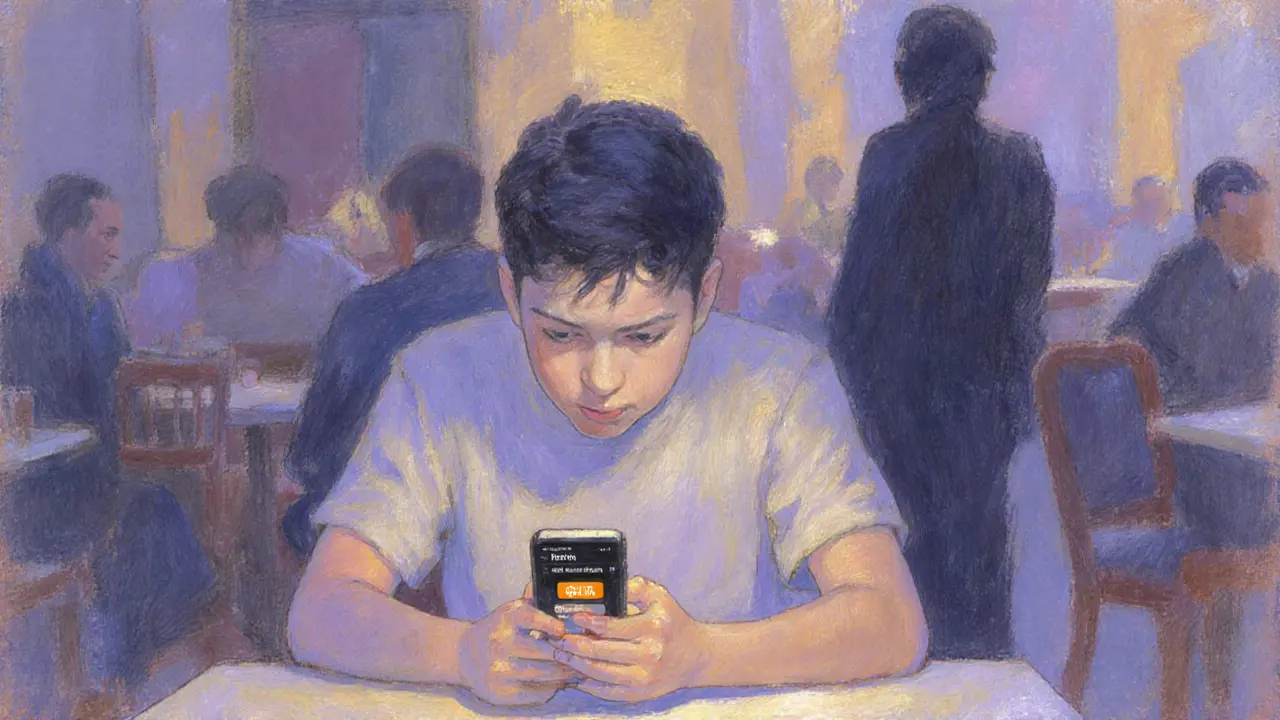
On paper, owning Bitcoin or using Ethereum in Tunisia is a crime. Not a gray area. Not a risk. A crime punishable by up to five years in prison. Since May 2018, the Central Bank of Tunisia (BCT) has enforced one of the strictest cryptocurrency bans in the world - no trading, no mining, no payments, no exchanges. Not even holding crypto in a wallet is legally safe. This isn’t a rumor. It’s the law.
What Exactly Is Banned?
The 2018 directive from Tunisia’s Central Bank doesn’t just discourage crypto. It outlaws nearly every possible interaction with it. You can’t buy Bitcoin on Binance or Coinbase using your Tunisian bank card. You can’t accept Dogecoin as payment for your handmade crafts. You can’t mine Ethereum on a rig in your garage. And if you try to convert your crypto into Tunisian dinars? That’s a direct violation. The ban covers:- Buying or selling cryptocurrencies on any platform
- Operating or running a crypto exchange within Tunisia
- Accepting crypto as payment for goods or services
- Mining cryptocurrencies using ASICs or GPUs
- Importing mining hardware - customs can seize it at the border
- Using crypto to send or receive money across borders
Why Did Tunisia Do This?
The official reason? Protecting the Tunisian dinar. In 2018, Tunisia was already struggling with high inflation, low foreign reserves, and a growing black market for dollars. The Central Bank feared that crypto would accelerate capital flight - people moving money out of the country to avoid devaluation. They also worried about money laundering. With weak financial oversight in the past, officials believed unregulated digital assets could become a tool for criminals. It wasn’t just about crime. It was about control. Central banks like Tunisia’s rely on controlling the money supply. Crypto, by design, removes that control. If people start using Bitcoin instead of dinars for daily purchases, the government loses its ability to manage interest rates, print money, or influence inflation. For a country with fragile economic foundations, that’s unacceptable. Tunisia joined a small club of nations with total crypto bans: Algeria, Morocco, Egypt, Nepal, Bangladesh, China, and Qatar. Most other countries - even those with strict rules - allow some form of trading or investment. Tunisia didn’t go halfway. It went all in.Who Enforces the Ban?
Three institutions make sure the ban sticks:- Central Bank of Tunisia (BCT) - the main enforcer. They issue the rules and tell banks what to block.
- Ministry of ICT & Digital Economy - monitors tech-related violations, including mining and crypto startups.
- Financial Market Council (CMF) - oversees financial markets. If crypto were ever legalized, they’d be the ones regulating it.
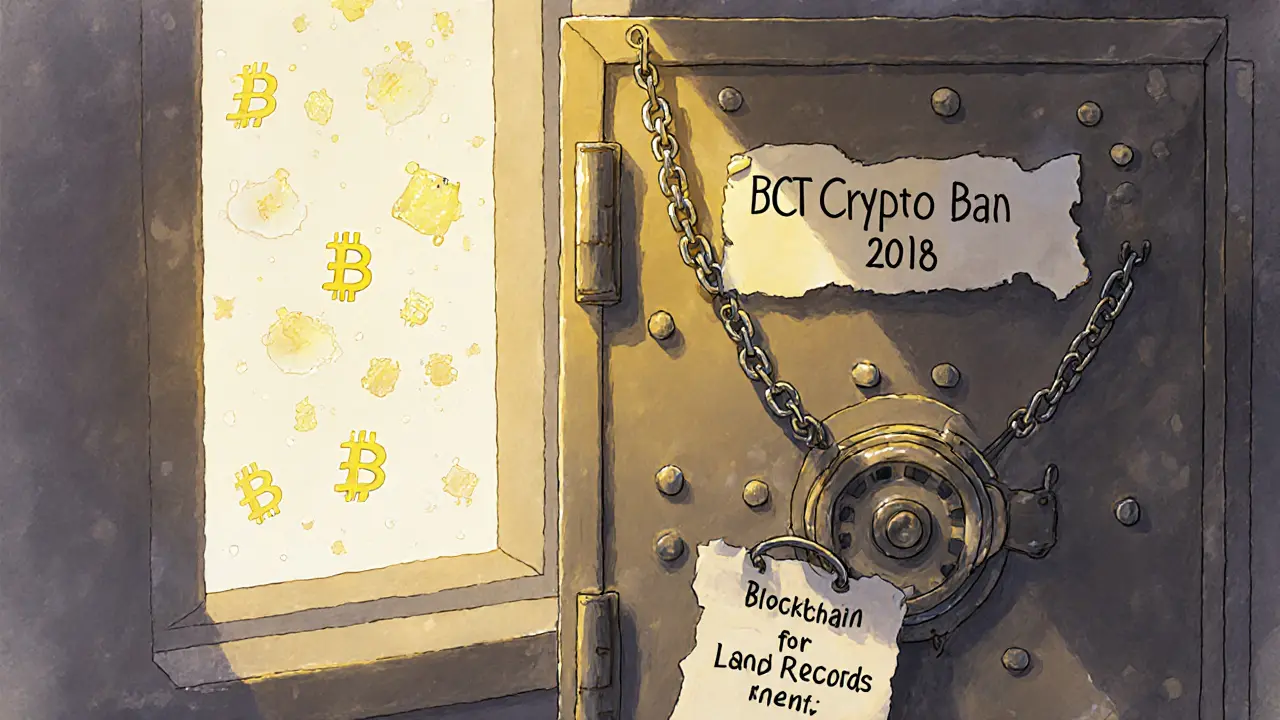
What About Blockchain? Is That Banned Too?
Here’s the twist: Tunisia doesn’t hate blockchain. It just hates crypto. In 2020, the BCT launched a regulatory sandbox - a controlled testing zone for fintech companies. Startups like VFunder (for crowdfunding), Hydro E-Blocks (for carbon tracking), and No Phobos (for AI-generated NFTs) were allowed to test blockchain applications. But here’s the catch: they had to run their systems outside Tunisia. Servers had to be in France or Germany. Users had to be non-residents. The blockchain worked. The crypto didn’t. The government sees real value in blockchain for things like:- Digitizing land registries
- Tracking government subsidies
- Securing public records
Is Crypto Still Used in Tunisia?
Yes. Quietly. Despite the ban, a hidden crypto economy exists. Before 2018, Bitcoin was traded in private chat rooms. That didn’t stop. It just went underground. People still buy crypto through peer-to-peer platforms like LocalBitcoins or Paxful. They meet in cafés. They pay in cash. They use trusted intermediaries. Some Tunisians send remittances through crypto to avoid high fees from Western Union. Others use it to protect savings from dinar devaluation. One survey in 2023 estimated that over 150,000 Tunisians have held crypto at some point - even if they’re not actively trading now. But it’s risky. If caught, you could lose your money, your device, or your freedom. Banks don’t just block transactions - they report suspicious activity to the Tunisian Financial Analysis Committee (CTAF). And CTAF can freeze accounts without a court order.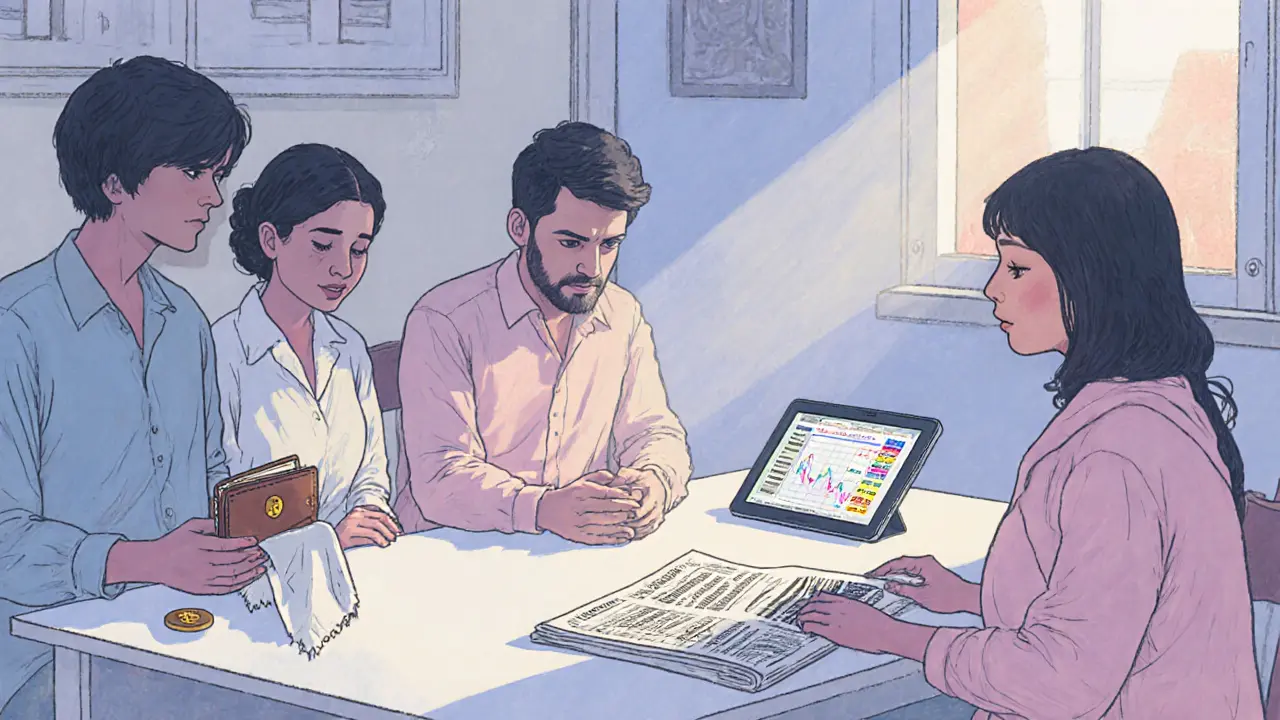
Is the Ban Going to Last?
It might not. As of 2025, Tunisia’s parliament is reviewing a draft bill that could decriminalize personal crypto ownership. The proposal would replace the ban with a licensing system - think of it like how casinos are regulated. Exchanges would need government approval. Miners would have to register. Taxes would apply. Why the shift? Three reasons:- Global pressure - Companies like PayPal and Tesla accept crypto. Tunisia’s youth are connected to the world. They see it as normal.
- Economic strain - The dinar keeps losing value. Crypto offers a way out for ordinary people. Banning it doesn’t stop demand - it just makes it dangerous.
- Regulatory models exist - The Financial Action Task Force (FATF) has clear rules for crypto AML compliance. Tunisia already uses these rules for banks. They could adapt them for crypto.
What Should You Do If You’re in Tunisia?
If you’re a resident:- Don’t buy crypto with your Tunisian bank account. It will be blocked. You might get flagged.
- Don’t mine. Customs seizes equipment. You won’t get it back.
- Don’t accept crypto as payment. Even if your customer is a friend.
- If you already hold crypto, keep it private. Don’t advertise it. Don’t talk about it online. Don’t transfer it through local channels.
- Don’t try to open a crypto exchange. You’ll be shut down - fast.
- Don’t use local ATMs or payment terminals for crypto. They don’t exist legally.
- Use crypto only for personal savings, and keep it off Tunisian soil. Store it on hardware wallets, and never connect them to local networks.
What’s Next for Tunisia?
Tunisia stands at a crossroads. On one side: total prohibition, outdated controls, and growing frustration from young, tech-savvy citizens. On the other: regulated crypto, financial innovation, and integration with the global digital economy. The 2018 ban was a reaction to fear. The 2025 draft bill is a response to reality. The country can’t afford to stay isolated forever. Money flows. Technology spreads. People adapt. Whether Tunisia chooses to regulate crypto or keep banning it, one thing is clear: the conversation has changed. The ban isn’t just law anymore. It’s a debate.And debates, unlike bans, can be won.
Post Comment


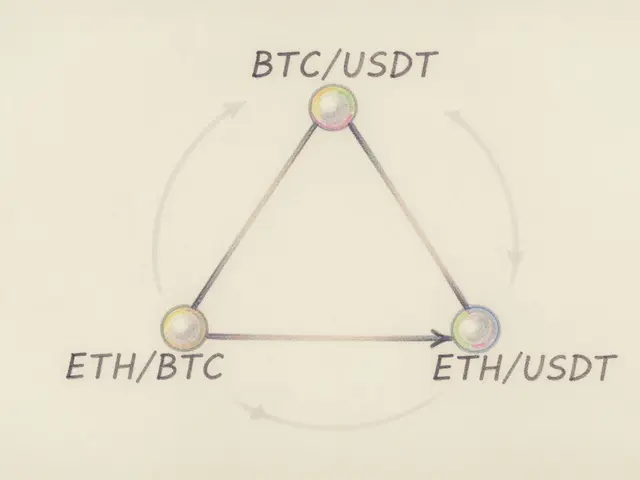
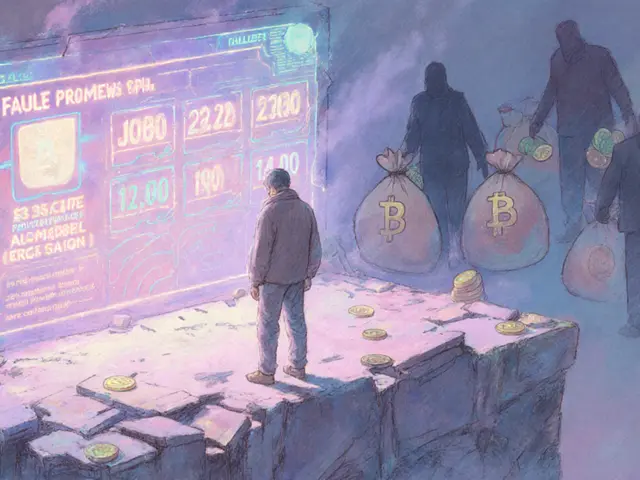
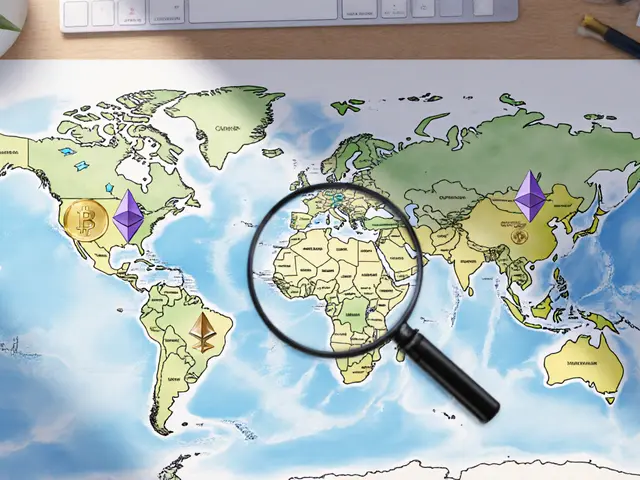
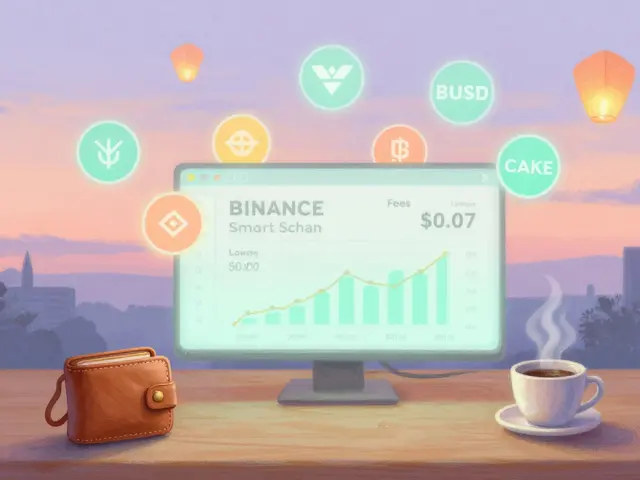
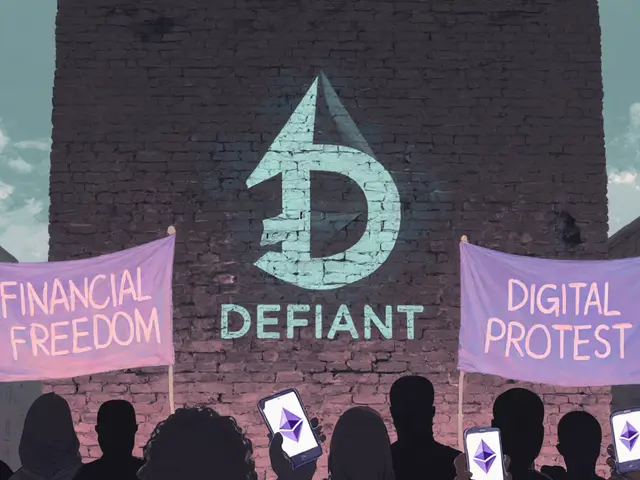
Okay but imagine being a teenager in Tunisia and getting locked up for trading $200 in Bitcoin. That’s not law enforcement, that’s digital witch hunting. The government’s scared of people having control over their own money - and honestly? That’s the most terrifying thing about this whole ban.
Meanwhile, in the US, my 14-year-old cousin mined Dogecoin on her laptop and used it to buy snacks. No one blinked. We’re not even talking about the same planet.
It’s not about crime. It’s about power. And power doesn’t like being decentralized.
Also - blockchain is fine? Cool. So you want the tech that makes crypto possible but not the actual currency? That’s like saying you love electricity but hate outlets. Hypocritical and weird.
Also, why is no one talking about how many Tunisians are using crypto to protect their savings from inflation? That’s not a crime. That’s survival.
They’re banning a tool because they’re too scared to fix the system that made people need it in the first place.
Also also - if you’re gonna ban crypto, ban the banks that are bleeding the economy dry. That’s the real villain.
Anyway. I hope Tunisia flips the script. People are tired of being treated like children.
Also, I’d move there just to protest with a laptop and a VPN. #CryptoFreedomNow
It’s wild how the same government that’s terrified of crypto is totally fine with cash smuggling and black-market dollar trading.
They’re not protecting the dinar - they’re protecting their own control over it.
And the fact that they’re okay with blockchain for land registries but not for wallets? That’s not logic. That’s selective fear.
People aren’t dumb. They see the hypocrisy. And they’re finding ways around it anyway.
It’s like banning water because someone once used it to drown someone. You’re punishing the tool, not the misuse.
Hope they change their mind before another kid ends up in jail for holding a private key.
OMG I just read this and I’m shaking 😭 like why would you ban crypto but allow dollar black markets?? That’s literally worse!!
Also I’m from India and we have like 100 million crypto users and no one’s in jail 😅
Also why are you letting blockchain in but not crypto?? That’s like saying you love cars but hate wheels??
Also I have a friend who moved to Tunisia and he got his USB stolen and now he’s crying because he lost 5 BTC 😭😭😭
Also I’m gonna start a petition for Tunisia to legalize crypto I’m so mad rn
Ohhh so THIS is why the Fed’s been so quiet about crypto lately… they’re watching Tunisia. They’re testing the waters. They’re seeing how far they can push people before the masses revolt.
They don’t care about inflation or money laundering. They care about control. And if they can make a whole country terrified of holding digital money… what’s stopping them from doing it here?
Mark my words: this isn’t about Tunisia. It’s a blueprint.
They’ll ban your crypto wallet next. Then your Bitcoin ATM. Then your Ledger. Then your brain if you think about it too much.
They’re building the surveillance state one crypto ban at a time.
And the worst part? You’re all just sitting here arguing about it like it’s a Reddit thread.
Wake up. This is the first domino.
And they’re already holding the hammer.
This is a deeply nuanced situation. While the ban is draconian, the concerns of the Central Bank are not baseless - inflation, capital flight, and weak regulatory infrastructure are real challenges in emerging economies.
However, criminalizing personal ownership of crypto is disproportionate. The solution lies not in prohibition, but in regulation - as the draft bill suggests.
Blockchain’s acceptance for public records shows the government understands the technology’s value. It’s only the monetary aspect they fear.
Perhaps the real issue is not crypto itself, but the lack of financial literacy among the population.
Education, not imprisonment, should be the priority.
Also, the fact that 150,000 Tunisians still hold crypto despite the risk speaks volumes about the demand for financial autonomy.
It’s a classic case of policy lagging behind technological reality.
Let’s hope the legislative shift comes before another life is needlessly disrupted.
People are using crypto because the system failed them.
Not because they’re hackers.
Not because they’re criminals.
Because their money’s losing value every day.
And the government’s answer? Jail.
That’s not protection. That’s punishment for being broke.
They’re scared of losing control.
But you can’t control what people do in the dark.
They’ll find a way.
And when they do - it won’t be pretty.
Let them have it.
Let them be free.
It’s not dangerous.
Not letting them have it is.
There’s something poetic about a country banning the very thing that could save its people from economic collapse.
Crypto isn’t the problem. It’s the symptom.
The real disease is a system that lets inflation eat away at savings, that lets banks freeze accounts without warning, that lets a 17-year-old get arrested for trying to protect his money.
They’re not fighting Bitcoin.
They’re fighting the future.
And the future doesn’t care about your laws.
It just keeps coming.
Maybe one day they’ll realize: you don’t stop a river by building a wall.
You redirect it.
And maybe - just maybe - you let it water your garden instead of drowning it.
Broooo this is wild 😍 I just looked up Tunisia’s crypto ban and now I’m obsessed 😭
So like, they ban crypto but allow blockchain for land registries?? That’s like saying you love the engine of a car but hate the gas 🤯
And the fact that they’re okay with black market dollars but not Bitcoin?? That’s like banning electric cars but letting people use diesel in the 2020s 😂
Also I found a forum where Tunisians are trading BTC via WhatsApp and cash meetups in Tunis cafés - like 2000s drug deals but with QR codes 🤭
Also one guy said he bought 0.5 BTC in 2017 and now it’s worth $30K - but he’s too scared to sell because if he converts it to dinars, the bank flags him 😭
Also the Central Bank is literally terrified of losing control - but they’re already losing control because people are leaving the country with their savings in crypto 😭
Also the draft bill in 2025 is a sign - they’re scared. They know the game is over.
Also I’m gonna start a TikTok series called ‘Crypto in the Shadow of the Ban’ - anyone wanna collab?? 😎
Also why is no one talking about how many Tunisian teens are using VPNs to trade on Binance?? It’s a whole underground economy now 🤫
Also I’m crying because I have a cousin in Tunisia and I just sent her a link to a hardware wallet tutorial 😭😭😭
Interesting how the ban doesn’t stop the behavior - it just makes it riskier.
People will always find a way to store value, especially when their currency is falling.
It’s not about technology.
It’s about trust.
When you don’t trust your government to protect your money, you look elsewhere.
And crypto? It doesn’t ask for permission.
It just works.
wait so you can get jailed for owning bitcoin?? like… what the f*** is wrong with these people??
my dog has more freedom than a tunisian with a wallet
and they let blockchain in?? so you want the tech but not the money?? that’s like saying you love pizza but hate cheese
also i just lost 2000 dollars because i forgot my pass phrase and now i’m crying in my car
also why is no one talking about how tunisia is basically a digital police state now??
also i think i’m gonna move there just to protest
also i think i’m gonna mine crypto in my garage and just say i’m ‘doing tech experiments’
also i’m gonna write a song about this
also i’m gonna cry again
Let me break this down for you slow folk: Crypto isn’t illegal because it’s dangerous. It’s illegal because it’s democratic.
Every time someone uses Bitcoin, they’re saying: ‘I don’t need your bank. I don’t need your approval. I don’t need your permission.’
That’s why they’re scared.
Not because of money laundering.
Not because of inflation.
Because people are starting to realize they don’t need you.
And that’s the real crime.
Also, if you think banning crypto will stop it - you’ve never met a 16-year-old with a VPN and a laptop.
They’re already 5 steps ahead.
And you’re still writing laws from 2018.
Good luck with that.
:P
Blockchain for land records? Cute.
But you won’t let people use crypto? So you’re okay with immutable ledgers for property… but not for savings?
That’s not policy. That’s cognitive dissonance on steroids.
Also, the fact that you’re allowing blockchain startups to host servers in Germany but not in Tunisia? That’s not innovation. That’s colonialism with a tech twist.
Also, if crypto is so dangerous, why is the Central Bank still using blockchain internally?
Also, if you’re so worried about capital flight, why don’t you fix the economy?
Instead of banning the cure, maybe try treating the disease?
Also, I’m pretty sure the guy who wrote this article has a crypto wallet.
And he’s not in jail.
Just saying.
🙂
Oh wow. A whole country banning crypto. How quaint. Like the Vatican banning the printing press.
Let me guess - they also banned bicycles because they’re ‘unregulated transportation’?
This isn’t a government. It’s a 1984 fanfic written by a central banker with imposter syndrome.
They’re terrified of a technology that gives power to the people.
And the fact that they’re okay with blockchain? That’s not hypocrisy. That’s intellectual cowardice.
They want the efficiency of decentralized systems - but none of the accountability.
They want to be the architects of the future - but only if they’re the only ones holding the keys.
It’s not crypto they fear.
It’s freedom.
And freedom? It doesn’t need permission.
It just exists.
And one day, it’ll be in every Tunisian’s wallet.
And they’ll realize: they lost.
And they’ll be too late to do anything about it.
Good luck with your prison sentences.
They’re not stopping the revolution.
They’re just making it more dramatic.
They’re not banning crypto because it’s dangerous - they’re banning it because it’s effective.
People are using it to escape inflation.
People are using it to send remittances without paying 15% fees.
People are using it because the system is broken - and they’re tired of begging for crumbs.
So they criminalize it.
Classic.
Instead of fixing the economy, they lock people up.
Instead of educating citizens, they intimidate them.
Instead of adapting, they dig in.
And now they’re shocked that people are still using crypto underground?
Of course they are.
Because you can’t outlaw human ingenuity.
And you definitely can’t outlaw desperation.
They’re not protecting the dinar.
They’re protecting their own irrelevance.
Let me be crystal clear: this ban is a disaster. A catastrophic failure of governance. A monument to bureaucratic panic.
Who authorized this? Who thought locking up teenagers for trading $200 in Bitcoin was a good idea? Who thought this would work?
It’s not just illegal - it’s insane.
And the fact that they’re allowing blockchain for public records? That’s not a loophole - it’s a confession.
They know it’s the future. They just don’t want to admit it.
Also - how many people have lost their life savings because they got caught? How many families are broken because someone dared to protect their money?
And yet, the government sits there like a statue, pretending they’re in control.
They’re not.
They’re just loud.
And soon, they’ll be irrelevant.
And then what? Will they un-jail the kids? Will they apologize?
Or will they just write another law?
Pathetic.
It’s not about crypto.
It’s about who gets to decide what money is.
For centuries, governments held that power.
Now? You can hold it in your hand. Literally.
And that terrifies them.
Not because it’s risky.
Because it’s real.
Real money. Real freedom. Real choice.
And they can’t control it.
So they try to erase it.
But you can’t erase what people already know.
They know crypto works.
They know it’s safer than their bank.
They know it’s faster than Western Union.
And now? They know the law is a lie.
Because the law doesn’t stop people.
It just makes them smarter.
And more determined.
So they ban crypto but allow blockchain? That’s like saying you hate soda but love carbonation.
Also I heard someone in Tunisia got arrested for using a VPN to buy Bitcoin.
Also I think this is the dumbest law ever.
Also I’m gonna send my dog a Bitcoin.
Also I’m gonna cry now.
Also why is this even a thing?
Also I’m gonna make a meme about it.
Also I’m gonna move to Tunisia just to protest.
Also I’m gonna start a podcast called ‘Crypto in Prison’.
Also I’m gonna stop typing now because I’m too mad.
I’ve been thinking about this all day. Not just the ban - but the silence around it.
How many people in Tunisia are holding crypto right now, scared to speak up?
How many parents are hiding wallets from their kids because they’re afraid the bank will trace it?
How many students are using fake IDs to buy Bitcoin on peer-to-peer platforms?
And yet - no one talks about it.
Because the fear is real.
Not the fear of losing money.
The fear of losing freedom.
And that’s what makes this so tragic.
It’s not about technology.
It’s about trust.
And when a government chooses control over trust - it doesn’t matter how many laws it passes.
It’s already lost.
Because people don’t need permission to believe in something better.
They just need a way.
And they’re finding it.
Quietly.
One private transaction at a time.
There’s a quiet revolution happening in Tunisia - and it’s not loud.
No marches. No hashtags. No press releases.
Just a teenager in Sousse, holding a Ledger in his sock, whispering a seed phrase to his cousin over WhatsApp.
A mother in Gabès, sending dinars to a friend in France who converts them to Bitcoin and sends it back - bypassing Western Union fees and bank surveillance.
A coder in Bizerte, writing smart contracts for a blockchain land registry - but never mentioning the word ‘crypto’.
This isn’t rebellion.
This is resilience.
And it’s beautiful.
Because you can’t ban hope.
You can’t jail innovation.
You can’t stop a people who’ve lost everything - from finding a way to keep something for themselves.
They’re not breaking the law.
They’re rewriting it.
One private key at a time.
They banned crypto. People still use it.
They jailed a teen. Others keep trading.
They block banks. People use cash meetups.
They allow blockchain. But not the money.
They’re losing.
And they know it.
Let’s be real - this isn’t about financial stability. It’s about institutional ego.
The BCT sees crypto as a threat to its monopoly on monetary authority - and they’re reacting like a dying empire.
Blockchain integration? That’s a PR move. A fig leaf.
They want to appear ‘innovative’ while crushing the very thing that makes innovation possible - decentralization.
This is the same mindset that banned books, then later claimed they ‘supported literacy’.
They’re not regulating. They’re resisting.
And resistance is futile.
Because the future doesn’t ask for permission.
It just shows up.
And when it does - they’ll be the ones holding the outdated rulebook.
And no one will read it.
Who let these crypto bros take over the world??
First they want to replace our money, now they want to replace our government??
Tunisia’s got it right.
Keep your digital nonsense out of our country.
We don’t need some Silicon Valley nerd telling us how to live.
Our dinar is OURS.
And we’ll protect it from crypto anarchists.
Let them have their Bitcoin in the US.
We’re proud of our traditions.
And we’re not letting some app ruin our economy.
Also I heard crypto is run by Jews.
And I’m not letting that happen here.
Stay strong Tunisia.
God bless the dinar.
Look - I get why they banned it.
It’s scary.
When people start using something outside the system, it shakes everything.
But banning it? That’s like trying to stop the tide with a broom.
People are using crypto because they’re scared.
They’re scared their money will vanish.
They’re scared their kids won’t have a future.
So they turn to Bitcoin.
Not because they’re tech geniuses.
Because they’re human.
And if you’re gonna ban something that gives people hope -
you better have a better plan.
Otherwise?
You’re not protecting the economy.
You’re just making it harder for people to survive.
Also - the fact that the Central Bank is running a blockchain sandbox in Germany? That’s not innovation.
That’s digital colonialism.
They want the benefits of the tech - but they don’t want Tunisians to touch it.
That’s not progress.
That’s theft.
And it’s not just about money.
It’s about dignity.
Wait so the blockchain sandbox is hosted in Germany?? 😱
So Tunisia is using blockchain tech… but only if it’s hosted outside the country??
That’s like saying you love pizza… but you can only eat it in Italy 😂
Also I just found a Reddit thread where Tunisians are trading BTC via Telegram and paying in cash at McDonald’s in Sousse 🤯
Also the 17-year-old kid who got arrested? He’s now a meme. Everyone calls him ‘Bitcoin Boy’ 😭
Also I think Tunisia’s gonna be the first African country to legalize crypto because of this backlash 😎
Also I’m gonna send him a Bitcoin tip if I can find his wallet 😅
They banned the money.
But they didn’t ban the need.
And that’s why this will fail.
Not because of tech.
Because of people.
And here’s the irony.
The same government that jails teens for holding Bitcoin is quietly using blockchain to track subsidies.
They’re not afraid of transparency.
They’re afraid of giving it to the people.
They want to see everything.
But they don’t want you to see anything.
That’s not governance.
That’s control.
And control always crumbles.
It just takes longer when it’s built on fear.
They think banning crypto will stop capital flight.
But it’s not crypto that’s draining the dinar.
It’s corruption.
It’s mismanagement.
It’s the elite who own offshore accounts.
They’re punishing the poor for the sins of the powerful.
And that’s the real crime.
They’re not banning crypto.
They’re banning the idea that people can be trusted with their own money.
And that’s the most dangerous law of all.